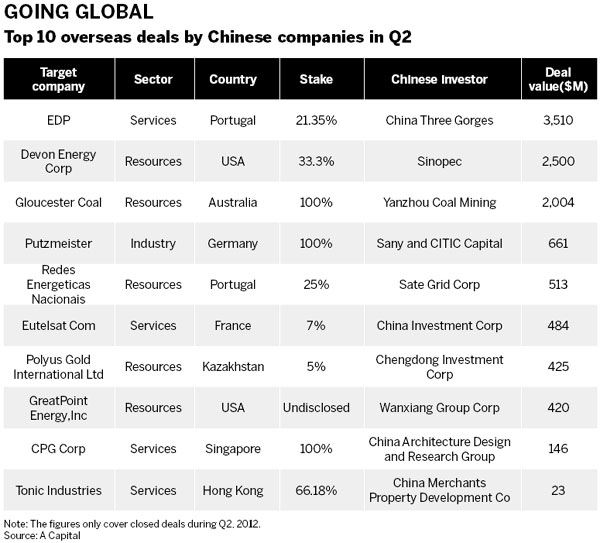Setting sail on a quest for overseas M&As
Updated: 2012-10-22 09:04
By Wei Tian and Li Jiabao (China Daily)
|
||||||||

After Sweden and the UK became the first two countries to establish investment-promoting offices in China a decade ago, European countries have since set up more than 30 similar bureaus. "There are basically no countries that haven't done it," Chan said
Local governments in many countries including the UK and Spain have also set up a representative office in China to promote their own regions' investment opportunities.
Countries have their own preferences for industrial investment and targets. The comparatively developed countries in western Europe and Scandinavia are hoping to carry out cooperation with China in high-tech areas by virtue of their technical superiority, whereas those in southern, central and eastern Europe now mainly focus on light industry and agriculture.
A recent survey by accountancy and management consultancy firm Ernst & Young showed that Europe is still the first choice for future overseas investment by Chinese entrepreneurs. "Europe is the cradle of the Industrial Revolution (1750-1850), as well as the presenter and practitioner of the concept of sustainable development. Compared with North America, the overall policies are more open. This is what Chinese investors really need," Chan said.
"In Sweden, for example, although there is a decline in investment flow from China this year, the quality of cooperation keeps growing in such areas as new energy, the automobile industry, mobile communications and the advanced manufacturing field," said Chan.
The United States is also a favorite destination for Chinese investors. "In 2012, Chinese investment in the US will double the amount of last year and it will keep doubling for some time to come," said Harley Seyedin, president of the American Chamber of Commerce in South China.
"Certainly, I think, especially now, there are tremendous opportunities for Chinese investors in the fields of resources, energy, airspace and acquisition of companies with advanced technology. Right now US companies need cash and investment.
"Chinese companies can learn from their partners... and invest in US companies and then bring their products back to China to meet the huge market."
Chinese investment in the US jumped 38.5 percent from a year earlier to $1.81 billion in 2011. Meanwhile, China's overall outbound direct investment was $74.65 billion last year, according to the 2011 Statistical Bulletin on China's Outbound Direct Investment jointly released by China's Ministry of Commerce, National Bureau of Statistics and State Administration of Foreign Exchange in August.
The first eight months saw Chinese investment in the US increased 18.2 percent from the same period a year earlier, according to the ministry.
"Chinese investment in the US is likely to reach $3 billion or $4 billion in 2012 and the potential is $10 billion in the future. Several substantial Chinese companies are now in talks to invest in coal mining in Montana with an initial $2 billion to $3 billion and export the coal to China," Seyedin said.
Jennifer Zimdahl Galt, consul general of the American consulate in Guangzhou, said the US will be a very attractive investment destination for Chinese investors owing to its favorable economic environment, mature and open market as well as the efforts of SelectUSA, an agency established by US President Barack Obama in 2011 that seeks to highlight many advantages the United States offers as a location for business and investment.
Seyedin countered any fears of increasing Chinese investment in the US and said: "We are wide open to Chinese investment and there is no way for China to have all our products and there is no way for China to have all our technology because the Chinese economy and innovation is only about 20 years old."
Seyedin did not see hurdles for Chinese investment in the US and said: "The problem is to understand the market, the culture, the tax structure and the legal system. The first and the most important step for Chinese companies to make is to hire an accountant, a lawyer and people understanding both cultures. If they do all these things right, most of them will succeed".
Despite having an optimistic outlook on China's overseas investment, Arthur Wang, a global partner with McKinsey & Co, said there are still challenges facing Chinese managers in their overseas operations.
Apart from the traditional obstacles such as cultural differences, one of the major issues is to find the right balance in the elasticity of managing overseas units.
To that end, Chinese companies need to raise a group of top and middle management with international business experience and language skills. "At the moment, the lack of such talent is the biggest challenge facing ambitious Chinese investors," Wang said.

 Relief reaches isolated village
Relief reaches isolated village
 Rainfall poses new threats to quake-hit region
Rainfall poses new threats to quake-hit region
 Funerals begin for Boston bombing victims
Funerals begin for Boston bombing victims
 Quake takeaway from China's Air Force
Quake takeaway from China's Air Force
 Obama celebrates young inventors at science fair
Obama celebrates young inventors at science fair
 Earth Day marked around the world
Earth Day marked around the world
 Volunteer team helping students find sense of normalcy
Volunteer team helping students find sense of normalcy
 Ethnic groups quick to join rescue efforts
Ethnic groups quick to join rescue efforts
Most Viewed
Editor's Picks

|

|

|

|

|

|
Today's Top News
Health new priority for quake zone
Xi meets US top military officer
Japan's boats driven out of Diaoyu
China mulls online shopping legislation
Bird flu death toll rises to 22
Putin appoints new ambassador to China
Japanese ships blocked from Diaoyu Islands
Inspired by Guan, more Chinese pick up golf
US Weekly

|

|






